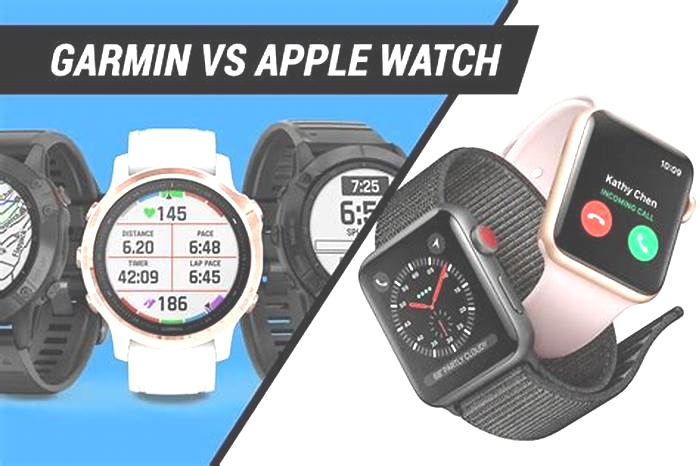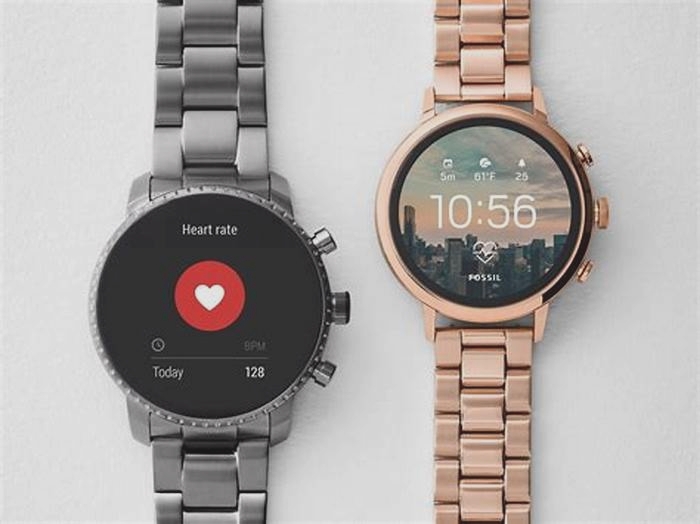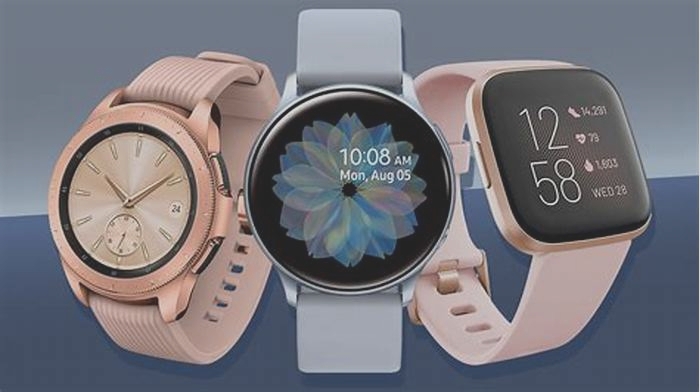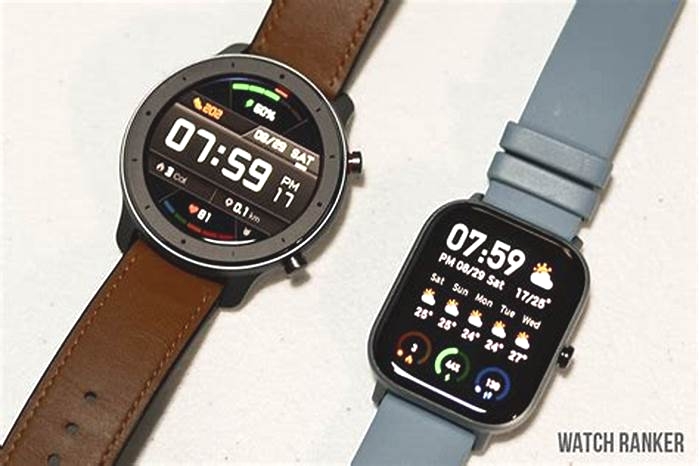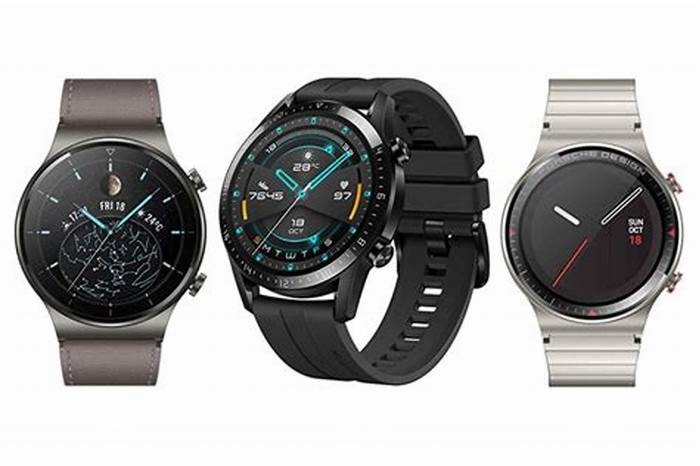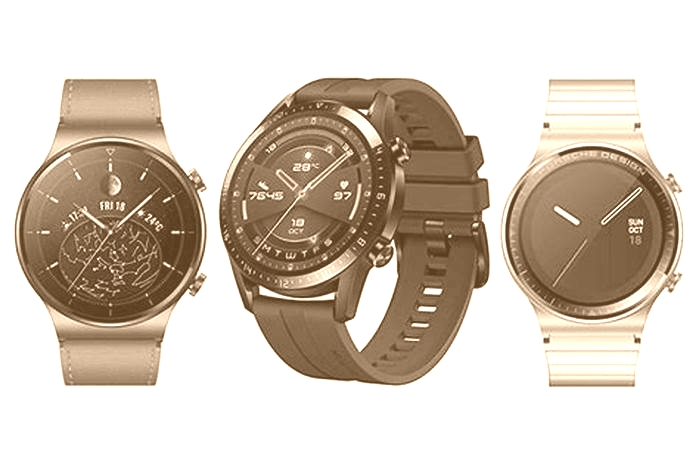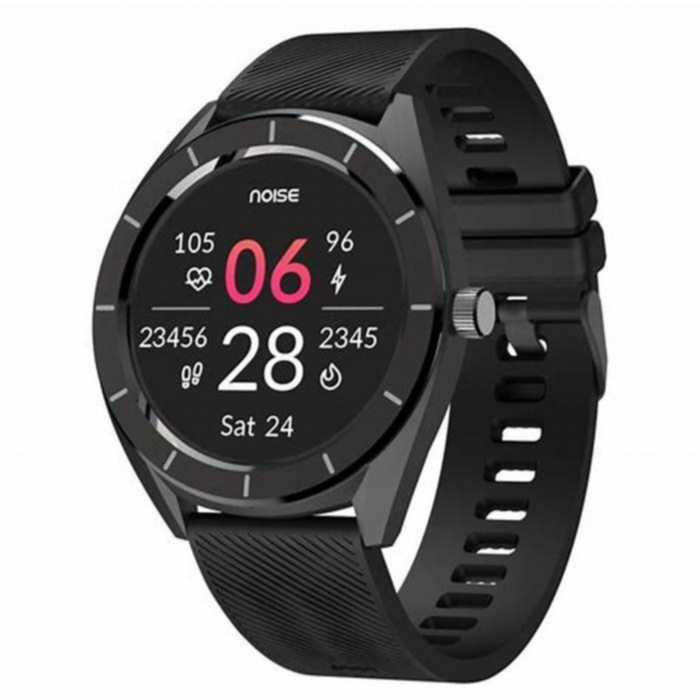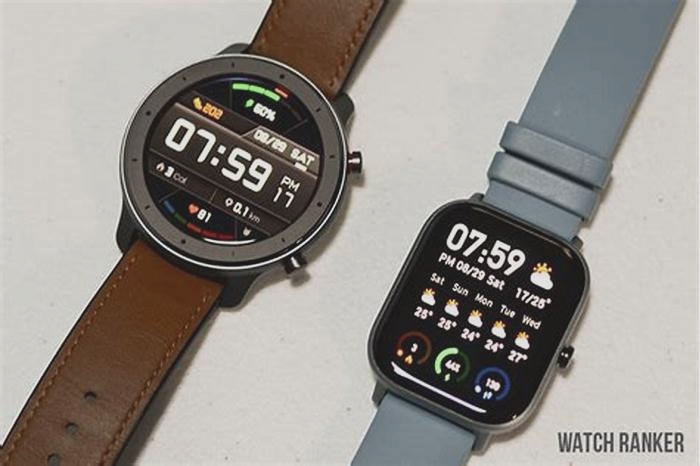Is Garmin a good smart watch
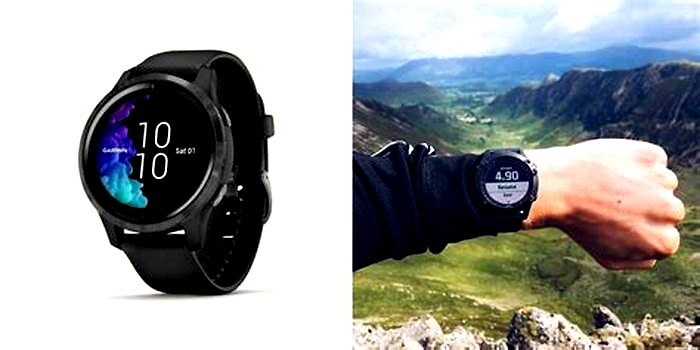
Best Garmin watch 2024: Tested and compared
The number of Garmin running and fitness watches continues to grow all the time, making the task of choosing a suitable device for your needs a difficult one.
The good news is the line-up is so crowded, there's a Garmin for every person, and every price point. But the issue is picking apart the range and understanding the increasingly subtle differences. And the launch of the Venu 3 and Vivoactive 5 makes that even trickier.
The breadth of Garmin's range means there's something for everyone, regardless of your budget. Below, we've tried our best to explain each of Garmin's running, outdoor, and multi-sport watches.
Quick look: Our top picks compared
- Best for beginner runners: Garmin Forerunner 165
We previously recommended the Forerunner 55 here, which is still a great budget Garmin pickup. But the Forerunner 165 offers an AMOLED screen, great battery life, accurate GPS, Garmin training plans and a smattering of Garmin's performance analytics. Perfect for people at the start of their running journey.
- Best for PB hunters: Garmin Forerunner 265
For those starting to fixate on their underlying running data, the FR265 is a step up. The crisp AMOLED display, decent battery life, and a wide range of features - including in-depth training analysis, performance analytics, recovery guides, and adaptive training plans - keen runners, cyclists, and swimmers are well catered for with this one.
- Best Garmin smartwatch: Garmin Venu 3
The Venu 3 offers a jack-of-all-trades Garmin sports tracking experience, with a slick AMOLED display that should satisfy those lusting over an Apple Watch or Samsung Galaxy Watch. The wellness features feel so much more useful and intuitive here, and the heart rate accuracy is top-notch.
- Best for ultra distances: Garmin Fenix 7
The king of multisport watches, the Fenix 7 range is almost untouchable. Huge battery life means you can spend all day on the trails, and take advantage of mapping and navigation features. And every sport benefits from the most advanced analytics offered on any Garmin. The Fenix 7S also offers the experience in a much more comfortable package and the Epix (Gen 2) brings an AMOLED display.
- Best Fenix alternative: Garmin Instinct 2 Solar
The Fenix is the king of the Garmin range, but many readers will (rightly) balk at the price. In these trying times, we urge a look at the Instinct 2 Solar, a fun, lightweight outdoor/fitness watch, with excellent battery life and some top performance analysis features.
Best Garmin running watches
The Forerunner range is huge. The more expensive the watch generally means greater the battery life, more advanced analytics based on heart rate, and the ability to store/listen to music. Here are our picks.
Garmin Forerunner 165
Wareable
squirrel_13020596
The Forerunner 165 fills a much-needed gap in Garmin's running watch lineup and brings AMOLED display tech to an affordable price point at last. At 43mm it's unisex, light, and comfy.
It's perfect for beginner and intermediate runners, we found excellent GPS accuracy in our testing and it doesn't shirk performance analytics either.
You get VO2 Max, adaptive training plans and Training Effect metrics. What's more, you can plan your races and use PacePro to get live pacing strategies.
Battery life is way above a normal smartwatch, with around 17 hours GPS and a couple of weeks as a smartwatch.
It packs Garmin's last-gen HR sensor, but accuracy was still good for steady runs, and only those pushing their HR to the max should worry.
The only gripe is that Garmin has separated music features into a more premium version, so you'll need to pay more to get Spotify on the wrist. Boo.
We love
- Lovely screen
- VO2 Max and analytics
- Excellent GPS accuracy
We don't love
- Music features on a more expensive version
- Not a "budget" watch
- Slow GPS lock
Read our full in-depth Garmin Forerunner 165 review.
Garmin Forerunner 265
Wareable
squirrel_12891315
Check price:Buy Garmin Forerunner 265
The Forerunner 265 acts as a superb mid-point in the Garmin sports watch range, making it a great fit for intermediate and advanced exercisers looking for something to help boost their training. It comes in a 46mm case size as standard, with the 41mm 265S variant a more unisex option and a great fit for females.
Not much has changed from the last generation, which is to be expected with just a nine-month gap between releases, but the key change - the introduction of an AMOLED display - is glorious.
It transforms the on-watch experience, with the new UI making tracking training and interacting with features like Morning Report, Training Readiness, Training Status, and Race Calendar an even bigger joy than they were in the last generation.
In our testing, Garmin's Multi-Band GPS/GNSS performed typically well - even in built-up areas - and the heart rate performance continues to compare very well to a chest strap.
The battery life has taken a bit of a hit with the move to AMOLED - now offering around four days of heavy usage between charges, as opposed to 10-12 with the Forerunner 255 - but Garmin is still well ahead of the pack in this regard.
And there's also plenty of opportunity to eke out even more if you turn the always-on display off. Those who don't care about that fancy new screen can always save some cash and pick up the Forerunner 255, as well.
This isn't necessarily the worst idea, either, with the Forerunner 265 launching at a higher price than its predecessor.
We love
- The AMOLED display
- The value is hard to beat
- Superb accuracy in our testing
We don't love
- Not too different from the 255/255S
- Battery life much less than predecessor
- Smart features are minimal
Read our in-depth Garmin Forerunner 265 review
Garmin Forerunner 965
Wareable
squirrel_12891316
The 965 is the most advanced Forerunner in Garmin's lineup - and is now even more premium with the move over to AMOLED.
It's not too dissimilar to the cheaper Forerunner 265 (above), but there are some subtle differences that make it a great fit for those put off by the price of the Fenix/Epix range - or those who just want something lighter and easier to run, cycle or swim with.
In terms of features, it's a very similar experience to what you'll find with the last-gen Forerunner 955, with that display being the biggest difference between the two.
The bright and punchy screen does mean battery life has dipped slightly, but Garmin has still done very well here; the Forerunner 965 is able to power around 6-8 days of relatively heavy training in its always-on mode, which blows the competition out of the water.
It's as feature-packed as it gets, too. Garmin's full gamut of extras - including beautifully crisp offline mapping and access to pre-loaded golf courses - joins the list of focused and detailed running, cycling, and swimming insights.
It's also incredibly accurate. In our extensive test, we found the GPS accuracy, heart rate monitoring, sleep tracking, and plenty more line up with our expected baselines from some of the most accurate wearables on the market.
It all combines to make the Forerunner 965 a great pick for those who want something just a little extra to the 265. And for those who aren't overly fussed about the display upgrade, you can take advantage of slightly better battery life and the cheaper price of the Forerunner 955.
We do have some slight concerns about the durability of the display and titanium bezel, so think carefully if you're choosing this one over a Fenix/Epix, but know the rest of this package is hard to beat.
We love
- The AMOLED display
- Battery life performance
- Unrivaled tracking accuracy across the board
We don't love
- Prone to bumps and scratches
- Not too different from the 265
- Smart features are quite basic
Read our in-depth Garmin Forerunner 965 review
Garmin Forerunner 55
Wareable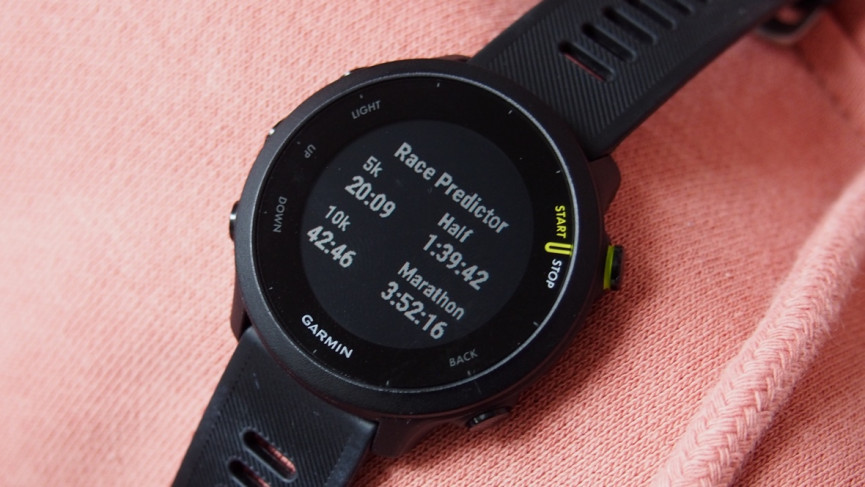
squirrel_12862581
The Forerunner 55 takes a small and comfortable running watch and adds a load more advanced features. However, the screen tech is clearly a big downgrade on the Forerunner 165, and this is now a budget pick.
In addition to tracking core metrics like pace, time, and distance there are also metrics for cadence, including a cadence alert, which will notify you if your steps per minute land outside of your desired target.
Garmin has included support for Garmin Coach, which means you can do guided run workouts from the wrist for distances like 5k and half marathon distance.
It's now inherited Garmin's PacePro pacing strategies feature, which has previously needed mapping support to put it to use. While the Forerunner 55 lacks those mapping features, it is still able to make use of PacePro to help tackle races.
Theres a renewed focus on recovery, and the Forerunner 55 will advise you on how long to rest after a session. It also offers daily suggested workouts based on logged sessions, the useful race predictor, and unlike the Forerunner 45, has full Connect IQ Store access.
We love
- Small, light design
- Suggested workouts
- Full Connect IQ support
We don't love
- Best HR accuracy requires a chest strap
- Low res screen
In-depth: Read our full Garmin Forerunner 55 review
Best Garmin multi-sport and triathlon watches
Whether you're a seasoned Ironman (or Ironwoman), dabbling in triathlon, or you just hate to be pigeonholed into one sport, these are the Garmin watches you need.
Garmin Fenix 7 (and 7S / 7X / 7 Pro)
Wareable
squirrel_12862597
The Garmin Fenix 7 range comes in three sizes, each with a Pro version, that adds a flashlight, upgraded HR sensor, and solar powers. So there's a mind-boggling array of choices even in the Fenix range alone.
- Fenix 7 / Fenix 7 Pro (47mm)
- Fenix 7S / Fenix 7S Pro (42mm)
- Fenix 7X / Fenix 7X Pro (51mm)
Whichever you choose (there are so many nuances you'll need to read our full reviews), they are exceptional multisport and outdoor watches.
Each boasts mega battery life (starting at 37 hours GPS on the smallest Fenix 7S), multiband GPS, 30+ sports modes (inc. advanced running, skiing, golf, and cycling modes), and in-depth analysis of recovery, training load, and VO2 Max.
Add to that TOPO mapping, GPX navigation, and over a month of battery life, and this is a powerful smartwatch.
However, Garmin's own brilliant range is starting to make the Fenix 7 less appealing.
The display is a low-res transflective panel that pales against the AMOLED of the Garmin Epix and Forerunner 265/965.
And the Instinct 2 Solar/Instinct 2X offer much of the battery life and performance analysis in a more fun and cheaper package.
So the Fenix is still the king of the Garmin range for now, but there are more reasons than ever to choose the Epix, or a cheaper alternative.
We love
- New mapping and touchscreen
- Improved GPS
We dont love
- So expensive
- Epix AMOLED display does steal the show
In-depth Garmin Fenix 7 review
Garmin Epix (Gen 2) / Epix Pro
Wareable
squirrel_12862598
Eagle-eyed readers will be aware that an Epix launched back in 2015 but thats been erased from history as the new Epix (Gen 2) returned in 2022 with a fresh purpose.
Essentially a Fenix 7 with an AMOLED display, the Garmin Epix brings all of the top features of the flagship, without compromise. It packs a glorious 1.3-inch, 454 x 454-pixel resolution, color AMOLED touchscreen that creates a powerful sports watch with a smartwatch feel.
And the Epix Pro (Gen 2) adds a flashlight, and three sizes to the range (42/47/51mm), which makes it a proper member of the Garmin family.
The Epix doesnt shirk the mapping, advanced performance analytics, new stamina mode, improved GNSS tracking, health sensors, and sports modes of the Fenix.
In short, the Epix is the ultimate Garmin experience.
Of course, battery life is diminished with the use of an AMOLED display but not as much as youd think. The standard Epix 2 offers 16 days of battery life and 42 hours of GPS (without the always-on display enabled), compared to 18 days/57 hours on the standard Fenix 7.
Most people will like that compromise. But you will pay significantly more for an Epix over a Fenix.
We love...
- AMOLED touchscreen
- Advanced analytics
- New Epix Pro case sizes
We dont love...
Read our full Garmin Epix review
Best Garmin smartwatch
A slightly confusing concept, as even the most basic watches are capable of tracking more than one type of activity, Garmin's multi-sport watches tend to include more than just running, cycling, and pool swimming.
We've also classified its three "smartwatches" here. Essentially, look into this list if running is just one part of your weekly fitness schedule.
Top choice: Garmin Venu 3
Wareable
The Garmin Venu 3 is a big improvement over the Venu 2, with a slicker design and improved UI as well as a more intuitive set of health features.
It's still a jack-of-all-trades sporty smartwatch so there are loads of sports profiles, but none offer the level of data and analysis you might expect from a Fenix or Forerunner.
Your main experience with the Venu 3 is with the daily suite of wellness metrics, displayed via widgets. It's pretty extensive, with Body Battery (energy levels), stress, steps, HRV Status, activity minutes, breathing rate, sleep, sleep coach, and more, all on display.
The Venu 3 also now has ECG, which has been enabled after launch.
We found heart rate and GPS accuracy to be top-notch, so while the Venu 3 isn't a powerhouse of athletic performance analysis, it does produce great data.
As a smartwatch, it does a good job of covering bases, with notifications, Garmin Pay (with patchy bank support), and offline Spotify syncing. However, it's not a patch on the smartwatch experience offered by Apple and Google. But with two weeks of battery life, (7-10 days of heavy use in our testing) it's a fantastic alternative.
The downsides are that the Venu 3 is pretty expensive and the Vivoactive 5 (below) offers most of its core features, at around half the price.
For runners and athletes, the Forerunner 265 is an obvious alternative and comes in a little cheaper.
Read our full Garmin Venu 3 review.
We love
- Sleek with a great screen
- Good wellness features
- Super accurate GPS and HR data
We don't love
- Light on performance metrics
- Expensive
Garmin Vivoactive 5
Wareable
The Garmin Vivoactive 5 returns after a long hiatus, and is a hugely appealing alternative to the Venu 3. It really should be the Venu 3 Lite.
At $299/259, it's nearly half the price of the Venu 3, and boasts the same wellness tracking, sleep features, and sports tracking line-up as the flagship.
It's not quite as sleek looking with an inferior AMOLED display, aluminum case, and it uses the older Elevate 4 heart rate sensor. Side-by-side it's quite a visual downgrade. What's more, there's no ECG on board here. So there are sacrifices in choosing the Vivoactive 5.
It's still a jack-of-all-trades, so you get running, swimming, cycling, workout, golf and other workout profiles but none offer advanced metrics or performance analytics.
Swim tracking is one of the most complete profiles, with stroke detection and efficiency scores, and the watch is 5ATM water resistant.
Battery life is excellent, with 11 days as standard, and 5 days with the always-on display enabled.
We love
- Great price vs the Venu 3
- AMOLED display
- Good wellness features
- Music and Spotify
We don't love
- Light on metrics and data
- Not as sleek as Venu 3
Full test: Garmin Vivoactive 5 review
Garmin Venu Sq 2
Wareable
squirrel_12862590
The Venu Sq 2 is the latest addition to the company's smartwatch range, offering a less refined package that enables Garmin to provide the same features as the Venu and Vivoactive 4 for less.
You get the same massive array of tracked sports, including running, cycling, swimming, gym, yoga, walking, pilates, and snow sports to name a few. And there's even breathwork, too.
You get GPS built-in, as well, and there's a SpO2 sensor that does spot checks. If you opt-in, there's also night and daytime blood oxygen monitoring.
It will track stress, and we love the Body Battery feature that studies your readiness for exercise and can guide you as to when to have a rest (or go hard on a session).
All the sports tracking metrics are pretty basic, so you won't get many of the VO2 Max and deep insights you'll find on the likes of the Forerunner 255.
The watch itself also lags behind the Vivoactive 4 and Venu and Venu 2 in terms of build quality. It's a plastic build with, a boxy design.
It blends a touchscreen and two physical buttons, and the interface that was once a bit fiddly is now much-improved. With a better screen this time around, too, it's a much better experience on the wrist - though the price has also been hiked a bit.
There's also a music version at $249/229, which means offline Spotify/Pandora playlists on the wrist. But for us, that takes it to a price point too far.
We love
- The new software UI is excellent
- Very solid sports tracking experience
- The AMOLED screen is a big improvement
We don't love
- More expensive than the first-gen model
- Bit of a bland design
Read our full Garmin Venu Sq 2 review
Best Garmin outdoor watch
If you're looking for a true outdoors watch then you have two main options in the Garmin range. The pinnacle is the Fenix 6, which we've named a top pick above. But its price tag is outrageous which is why Garmin has launched cheaper alternatives that don't skimp on the stuff trekkers need.
Top choice: Garmin Instinct 2/2X
Wareable
squirrel_12862599
No longer just an outdoor watch, the Instinct range is a fun, all-action multi-sport watch. It's essentially a cut-price Fenix, with a plastic case and low-res screen, with a big dose of Casio style added to the mix.
We love it and it's an unsung hero of the Garmin range.
The Instinct 2 delivers big battery life, with up to 30 hours of GPS tracking, and even more, if you choose Solar versions.
The Instinct 2 has broken free of being a simple lower-cost outdoor watch. There are profiles for track running, hiking, cycling, swimming, climbing, and even skiing, boating, and other types of outdoor pursuits. There's now golf mode too and it means the Instinct sits closer to the Fenix than most people realize.
Garmin has brought over running and training analysis features from its Forerunner watches like visual race predictions, VO2 Max estimates, training effect, and status insights. There are daily suggested workouts and a recovery advisor on board too.
You can upload routes, real-time breadcrumb navigation, and TrackBack but mapping doesn't make the cut.
The new Instinct 2X comes with a bigger 50mm case, solar power as standard, a flashlight (great for nighttime running safety and finding your way to the toilet while camping), and multi-band GPS for better accuracy. It also adds tons of Fenix advanced analytics and is very much a smart alternative for those looking to save some cash.
We love
- More workout stats than previous Instinct
- Noticeably improved battery life
- Versatile sports tracking
We don't love
- Design is not for everyone
- Improved screen resolution not huge
- Questionable sleep tracking
Read more: Garmin Instinct 2 review | Garmin Instinct 2X
Garmin Enduro 2
Wareable
squirrel_12863045
The Garmin Enduro is the company's latest specialist variation of the Fenix 7X Solar, and one built specifically for ultrarunners. Most people won't need the absurd 110 hours of GPS battery life and 254 hours in a max power mode. And that rises to an incredible 150 hours of GPS tracking and 714 hours if the Power Glass solar display is exposed to constant light.
To put the Enduro 2s battery life into context, we've found using the right power modes to track your efforts will see it happily survive most week-long and multi-day endurance challenges. It also has enough gas in the tank to cover a month-long streak for anyone running, riding, or swimming for an hour a day, as well.
Physically, however, it's a beast of a watch, and the 51mm case will be too much for most people. It's certainly not unisex. The new titanium-only build is more manageable than the stainless steel from the original but we found it uncomfortable to wear.
There are profiles for running, treadmill running, indoor track running, trail running, ultra running, and virtual running MTB cycling and swimming are also well supported.
The ultra run mode has a clever rest timer, splits out how long you spend at aid stations, and the trail VO2 Max estimate takes slower off-road runs into account and adjusts your reading accordingly.
Garmins excellent ClimbPro feature also includes descents as well as ascents, so you get a full picture of the quad-burning that awaits you on your preloaded courses. That includes real-time information on the current and upcoming climbs and descents with gradient, distance, and elevation gain/loss.
Our only real criticism of the Enduro 2 is the lack of an AMOLED display. It certainly makes sense, given this device's focus on massive battery life, but, with the price also increasing massively in this generation, it does sting a little.
We love
- Insane battery life
- Improved navigation with TOPO maps
- Offline music playback
We don't love
- Huge price tag
- Only comes in one size
- More expensive than the last-gen model
Read our full Garmin Enduro 2 review.
Garmin swimming watches
Garmin Swim 2
Wareable
squirrel_12862947
The Garmin Swim 2 is in no uncertain terms a massive upgrade on the first Swim as far as what its capable of when youre in the water.
Its the cheapest Garmin you can buy to get open water and pool swimming features though it would be even more attractive at a slightly lower price.
If you cant stomach paying for a top-end Forerunner or Fenix, this is the swimming-focused Garmin watch to go for instead.
There are more metrics, settings to play with, and of course, a smattering of smartwatch features to make it useful when you're not swimming. The Swim 2 will track lengths, distance, pace, stroke count, and SWOLF.
It can also detect stroke type, offer pace alerts, critical swim speed insights, and a handy auto rest feature.
Many of these can be viewed in real-time on the watch, but you'll get a better overview in the Garmin Connect app. Like most Garmin watches, it'll also play nice with Strava.
We love
- Easy to use
- Plenty of swim metrics
- Accurate tracking
We don't love
- Basic smartwatch features
- Doesnt have full Connect IQ support
- Screen a bit on the small side
Check out our Garmin Swim 2 review.
Garmin hybrid watches
Garmin Vivomove series
Wareable
squirrel_12862964
Garmin's Vivomove series combines analog and smartwatch looks and if you don't want to go all in with the level of sports tracking available on a Forerunner or Fenix and still want a stylish watch, this is the option for you.
The Sport is the latest addition to the Vivomove family, offering the same screen setup, albeit with a lower-quality display and polymer case look.
Like the Vivomove 3 or the Luxe, the Sport uses that digital display to show off information like heart rate, stress, daily fitness tracking, and notifications and can be used for music controls too.
There's no GPS, so those who want accurate run or cycle track will have to do so with their phone, but you do get a healthy array of overall tracking. Long-pressing the screen will bring up the option to select activities, at which point you can cycle between runs, cycles, walks, gym workouts, and more.
It's susceptible to the odd software hiccup, but generally, the hidden screen technology responds extremely well and is home to a wide array of features.
Promised battery life is up to 5 days and that's exactly what we got. Think of it more in fitness tracker terms than sports watch terms as far as how well that battery shapes up.
We wouldn't recommend serious sporty types pick up one of the Vivomove devices they should turn to the rest of Garmin's range but it's a more than capable fitness tracker for regular users.
We love
- Stylish design
- Software works beautifully
- Gamut of features
We don't love
- Just the 5 days of battery
- Screen visibility on the cheaper Sport
- Style and Luxe models are pricey
In-depth reviews: Garmin Vivomove Sport review | Garmin Vivomove 3 review
This article was first published in July 2015. However, we update it frequently to reflect the newest Garmin devices, making sure that we've tested the latest and greatest devices available to buy.


